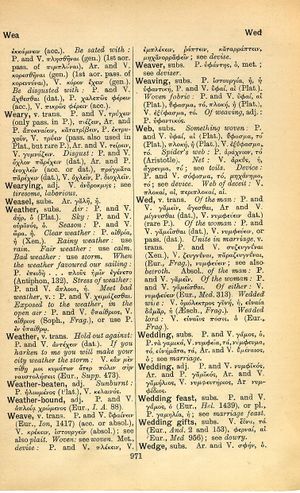wed: Difference between revisions
From LSJ
ἄμεινον γὰρ ἑαυτῷ φυλάττειν τὴν ἐλευθερίαν τοῦ ἑτέρων ἀφαιρεῖσθαι → for it is better to guard one's own freedom than to deprive another of his
(Woodhouse 5) |
(CSV5) |
||
| Line 1: | Line 1: | ||
{{ | {{Woodhouse1 | ||
| | |Text=[[File:woodhouse_971.jpg|thumb|link={{filepath:woodhouse_971.jpg}}]]'''v. trans.''' | ||
<b class="b2">Of the man</b>: P. and V. γαμεῖν, ἄγεσθαι, Ar. and V. μίγνυσθαι (dat.), V. νυμφεύειν dat.) (rare P.). | |||
<b class="b2">Of the woman</b>: P. and V. γαμεῖσθαι (dat.), V. νυμφεύειν, or. pass. (dat.). | |||
<b class="b2">Unite in marriage</b>, v. trans. P. and V. συζευγνύναι (Xen.), V. ζευγνύναι, παραζευγνύναι, (Eur., <b class="b2">Frag.</b>), νυμφεύειν; see also [[betroth]]. | |||
Absol., <b class="b2">of the man</b>: P. and V. γαμεῖν. | |||
<b class="b2">Of the woman</b>: P. and V. γαμεῖσθαι. | |||
<b class="b2">Of either</b>: V. νυμφεύειν (Eur., ''Med.'' 313). | |||
<b class="b2">Wedded wife</b>: V. [[ὁμόλεκτρος]] [[γυνή]], ἡ, εὐναία δάμαρ, ἡ (Aesch., <b class="b2">Frag.</b>). | |||
<b class="b2">Wedded lord</b>: V. [[εὐναῖος]] [[πόσις]], ὁ (Eur., <b class="b2">Frag</b>). | |||
}} | }} | ||
Revision as of 10:09, 21 July 2017
English > Greek (Woodhouse)
v. trans.
Of the man: P. and V. γαμεῖν, ἄγεσθαι, Ar. and V. μίγνυσθαι (dat.), V. νυμφεύειν dat.) (rare P.).
Of the woman: P. and V. γαμεῖσθαι (dat.), V. νυμφεύειν, or. pass. (dat.).
Unite in marriage, v. trans. P. and V. συζευγνύναι (Xen.), V. ζευγνύναι, παραζευγνύναι, (Eur., Frag.), νυμφεύειν; see also betroth.
Absol., of the man: P. and V. γαμεῖν.
Of the woman: P. and V. γαμεῖσθαι.
Of either: V. νυμφεύειν (Eur., Med. 313).
Wedded wife: V. ὁμόλεκτρος γυνή, ἡ, εὐναία δάμαρ, ἡ (Aesch., Frag.).

